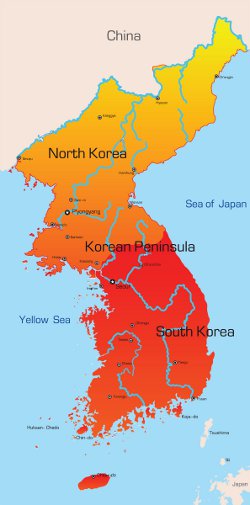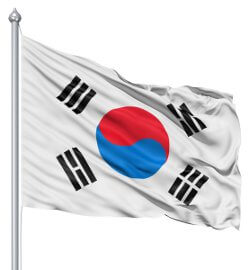English Reading Practice
South Korea
South Korea is a country located in Asia on the Korean Peninsula. A "peninsula" is a piece of land that has water on three sides. It shares this peninsula with another country, North Korea.

Scientists have found evidence that people have lived on the Korean Peninsula for 2.5 million years. "Evidence" mean proof or signs that something is true. The country that today we call the Republic of Korea or South Korea was created in 1948.
Even though it is a young country, it has many very old traditions. One of the most important and beautiful traditions is that of Korean Confucianism.
Korean Confucianism
Confucianism is a belief system or religion that originally came from China. It is based on the teachings of the Chinese philosopher Confucius.Confucianism came to Korea around the year 1400. Before that, many Koreans were Buddhists.
After Confucianism arrived, many Confucian schools were built. These schools had big libraries and were places to learn about the Confucian belief.
One of the most important parts of Confucian belief is ethics. "Ethics" means the rules you live by and how you treat yourself and other people. In Confucianism, it is important to be ethical and to treat others nicely and in the way that they should be treated.
Another important element (part) of Confucian belief is altruism. "Altruism" means selflessness or helping other people without wanting anything in return. Confucius taught that altruism was critical for a society to improve and become better. "Critical" means very important.
It is also important to study and acquire (get) knowledge about the world and about your culture. Confucians believe that having knowledge and learning about new things allows you to live a good life and avoid bad things. "Avoid" means stay away from.
Rituals are another important element of Confucianism. A "ritual" is something you do the same way every time. Some rituals practiced in Confucianism have to do with drinking tea, arranging flowers, talking to people and with parts of the marriage ceremony.
These beliefs don't only apply to individual people. They are also important for the government. Confucians believe that the government should also be ethical and knowledgable. The members of government should know a lot about the country and should always act in the best interest of the citizens.
Even today, Korean Confucianism is very important to many South Koreans. It influences people's relationships with each other, their relationships with their government, and the way that they live their own lives.
Teachers and elders (older people) are highly respected in Korean society in part because of Korean Confucianism. Confucian beliefs are also visible in many forms of Korean art. "Visible" means that it can be seen easily.
Even though Korean society has changed, Confucianism remains an important part of many South Koreans' lives. Elements like altruism, ethics, and learning are still very highly valued in South Korea. They are seen as important to maintaining peace in South Korean society and as important guides for government, the law, and individual people.

And now, practice:
South Korea - Exercises
Vocabulary Questions
1. What does "peninsula" mean?a) an island
b) land that has water on 3 sides
c) land that has no water around it
d) land that has many mountains
b) land that has water on 3 sides
c) land that has no water around it
d) land that has many mountains
2. What does "evidence" mean?
a) signs
that something is true
b) a definition
c) signs that something is not true
d) an explanation
b) a definition
c) signs that something is not true
d) an explanation
3. What does "elders" mean?
a) young people
b) old people
a) parents
b) children
b) old people
a) parents
b) children
Grammar Questions
1. Even though it is _________ young country, it has contributed many
things to the world.a) a
b) the
c) an
d) that
b) the
c) an
d) that
2. Confucianism is a belief system or religion that originally _________ from China.
a) comes
b) came
c) had come
d) will come
b) came
c) had come
d) will come
3. Some rituals practiced __________ Confucianism have to do with drinking tea, arranging flowers,
a) in
b) at
c) on
d) of
b) at
c) on
d) of
Comprehension Questions
1. What country does South Korean share the Korean Peninsula with?_______________________________________________________________
2. What country did Confucianism come from?
_______________________________________________________________
3. What are four important elements or parts of Confucianism?
_______________________________________________________________
Get Updates, Special Offers, and English Resources
Download your FREE GIFT (the first two chapters of
English Short Stories Book and Workbook)
as soon as you join!

By submitting your email, you consent to receiving updates and newsletters from us and to the sharing of your personal data with third parties for the purposes of sending you communications. We will not spam you. You can unsubscribe at any time. For more information, please see our privacy policy.




